|
|
|
Sort Order |
|
|
|
Items / Page
|
|
|
|
|
|
|
| Srl | Item |
| 1 |
ID:
183273
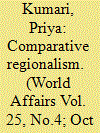

|
|
|
|
|
| Summary/Abstract |
The study of regionalism has witnessed some advances since the end of the Cold War. The paper attempts to further this study by undertaking a comparative analysis of the EU and ASEAN on the subject of human rights. It attempts to trace and compare the evolution of the human rights (HR) dimension in the intra-regional cooperation within these two supra-national organisations based on different principles and mechanisms. The author divides the evolution of intra human rights engagement of the EU and ASEAN into three phases: during and after the Cold War and in the post-9/11 era. Based on the detailed analysis, Priya Kumari concludes that intra-regional cooperation about human rights for the EU and ASEAN is contingent on domestic factors, though influenced by a variety of external stimuli.
|
|
|
|
|
|
|
|
|
|
|
|
|
|
|
|
| 2 |
ID:
111543
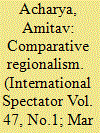

|
|
|
|
|
| Publication |
2012.
|
| Summary/Abstract |
Is comparative regionalism a field whose time has come? While the contemporary interest in comparing regions and regionalisms may be not completely new, it is different from older approaches. Our understanding of what makes regions has changed with social constructivist and critical theoretical approaches that have led to a less behavioural and more nuanced, complex, contested and fluid understanding of regions. Moreover, the globalisation phenomenon has deeply affected all social sciences and radically redefined the relative autonomy of regions. In keeping with the rapid growth and development of regionalism and institutions in the non-Western world, including in regions which were relatively late starters, such as Asia, there have emerged new ways of looking at regional cooperation, including claims about distinctive approaches and even 'models' that are not only different from those identified with the EU, but also supposedly more appropriate and thus 'workable' for non-Western regions than the EU straightjacket.
|
|
|
|
|
|
|
|
|
|
|
|
|
|
|
|
| 3 |
ID:
181945


|
|
|
|
|
| Summary/Abstract |
Researchers have increasingly investigated emerging regional citizenships outside the European Union, including in Southeast Asia, South America and West Africa. Their accounts have, however, largely focused on efforts by regional organisations to promote a regional identity and enhance mobility. This article applies a broader comparative framework disaggregating regional citizenship into six constitutive elements. The approach enables a more comprehensive analysis of the nature and shape of emerging organisational citizenship regimes, the identification of potentially significant alternatives, and more systematic comparisons of both across global regions. It is applied first in identifying a duties-centric, top-down and developmental conception of citizenship implicit in recent communications to ‘ASEAN citizens’ by the Association of Southeast Asian Nations. That conception is compared to alternatives, including one implicit in Amitav Acharya’s model of participatory regionalism, and one drawn from field work among regionally networked, digitally focused social entrepreneurs within ASEAN states. The latter indicate a conception which is duties centric but also foregrounds entrepreneurs’ potential for agency and leadership in regional development. We close with a discussion of different practical challenges, related to different elements of citizenship, each conception faces, and the potential for alternatives such as entrepreneurial regional citizenship to influence emergent organisational regimes.
|
|
|
|
|
|
|
|
|
|
|
|
|
|
|
|
| 4 |
ID:
178126
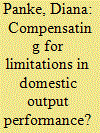

|
|
|
|
|
| Summary/Abstract |
Cooperation in regional international organizations (RIOs) can help member states to work toward and perhaps achieve policy goals that would not be feasible unilaterally. Thus, RIOs might be used as a means of states to compensate for domestic shortcomings in output performance. Do states equip RIOs with policy competencies in order to compensate corresponding domestic performance shortcomings? The analysis of a novel database on policy competencies of 76 RIOs between 1945 and 2015 reveals that usually RIOs are not usually used as window-dressing devices by which states disguise limited domestic output performance. Instead, governments tend to equip RIOs with policy competencies in order to further strengthen their already good output performance in most policy areas. However, in the policy area, ‘energy’ states tend to confer more competencies to their respective RIOs, the worse they perform domestically, indicating that output-related compensation dynamics might be at play in this field.
|
|
|
|
|
|
|
|
|
|
|
|
|
|
|
|
| 5 |
ID:
180345


|
|
|
|
|
| Summary/Abstract |
What explains the variation in how states collectively deal with public health challenges across different regions? We tackle this puzzle by comparing the regional health governance efforts pursued within the Central American Integration System (SICA) and the Union of South American Nations (UNASUR). We show that Central America's health governance has been driven by external actors, whereas South America's was driven by states within the region, and remained insulated from external actors’ influence. We argue that the explanation for such variation lies in the interplay of state capacity and regional leadership. In Central America, weak state capacity combined with the absence of a regional leader willing to provide governance resources. This opened up space for external actors to contribute actively to regional health governance, complementing the governance of Central American governments. In South America, Brazil's regional leadership mobilised neighbouring states’ capacities by promoting a South-South cooperation agenda based on intra-regional exchanges among national health bureaucracies, which, however, proved vulnerable to intergovernmental conflicts. Through the comparison of Central and South America, the article bridges the gap between global health governance scholarship and comparative regionalism, providing new insights on the determinants and effects of regional health governance modes in the Global South.
|
|
|
|
|
|
|
|
|
|
|
|
|
|
|
|
| 6 |
ID:
141731
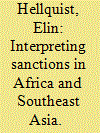

|
|
|
|
|
| Summary/Abstract |
The Organization of African Unity (OAU) and the Association of Southeast Asian Nations (ASEAN) were both born to stabilise vulnerable state borders by practising non-interference in domestic affairs. Today, the OAU’s successor, the African Union (AU), uses sanctions against unconstitutional changes of government, while ASEAN continues to rule out any collective punitive action against members. To explain these divergent trajectories, this article first shows how different traditions produced different ways of engaging with sanctions in the early formative cases of South Africa and Vietnam. Thereafter, it examines how these traditions were selectively re-thought when confronted with the dilemmas of international sanctions against Libya and Myanmar. The interpretive approach enables a nuanced account of continuity and change in beliefs about sanctions. The AU’s sanctions doctrine has updated rather than broken with a traditional interpretation of non-interference. For ASEAN, the longstanding tradition of informality – and not strict adherence to non-interference – has continued to rule out regional sanctions.
|
|
|
|
|
|
|
|
|
|
|
|
|
|
|
|
| 7 |
ID:
178127


|
|
|
|
|
| Summary/Abstract |
In Latin America and Southern Africa, norms on violence against women have developed with ups and downs, not simply in reaction to global norms, but sometimes even preceding global norm diffusion or surpassing it in terms of scope, framing and binding character. The classic global-to-local account with a single source of norm creation cannot capture these dynamics. Including the regional level in a dynamic model of norm diffusion enables us to understand the changing contents of a norm and to acknowledge transregional agency. We show (1) how norm contestation is an ongoing, multidirectional and polycentric process; (2) how the regional level opens up opportunities for feminists and femocrats; and (3) under which conditions regional norms can be both more progressive than global ones and more adapted to regional needs, and, in turn, are thus able to strengthen the ‘global’ norm.
|
|
|
|
|
|
|
|
|
|
|
|
|
|
|
|
| 8 |
ID:
153125
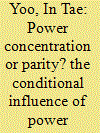

|
|
|
|
|
| Summary/Abstract |
Which condition between power concentration and power parity among regional countries is conducive to regional economic integration? The literature has suggested mixed findings as to the influence of power distribution. This study examines conditional effects of power distribution by identifying associated conditions to produce formal regional economic integration. Based on the comprehensive data on plurilateral trade agreements, this study employs both fuzzy set Qualitative Comparative Analysis (fsQCA) and process tracing techniques. The fsQCA reveals multiple jointly sufficient conditions to the outcome. In particular, I focus on two such conditions: (1) the presence of a regional hegemon with surrounding countries of homogeneous polity type and (2) the strong intraregional trade interdependence in conjunction with power parity among countries. These conditions are further supported in within-case analyses. These results indicate the conditional effect of power distribution and the existence of multiple paths toward regional economic integration.
|
|
|
|
|
|
|
|
|
|
|
|
|
|
|
|
| 9 |
ID:
097922


|
|
|
|
|
| Publication |
2010.
|
| Summary/Abstract |
There is virtually no systematic debate on the fundamentals of comparative research in the study of international regionalism. The field of research is very fragmented and there is a lack of interaction between EU studies and regionalism in the rest of the world. There is also a lack of communication between scholars from various theoretical standpoints and research traditions. Related to these two divides is the tension between idiographic and nomothetic methodologies. The purpose of this article is to contribute to the largely neglected debate on how to conduct and address three interrelated problems: a conceptual, a theoretical and a methodological one. Our claim is that the future of comparative regionalism should be one where old divides are bridged. This requires a combination of conceptual rigor, theoretical eclecticism, and sounder empirical research methods.
|
|
|
|
|
|
|
|
|
|
|
|
|
|
|
|
| 10 |
ID:
148133
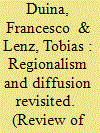

|
|
|
|
|
| Summary/Abstract |
An emerging research programme on diffusion across regional international organisations (RIOs) proposes that decisions taken in one RIO affect decision-making in other RIOs. This work has provided a welcome corrective to endogenously-focused accounts of RIOs. Nevertheless, by focusing on the final design of policies and institutional arrangements, it has been conceptually overly narrow. This has led to a truncated understanding of diffusion’s impact and to an unjustified view of convergence as its primary outcome. Drawing on public policy and sociological research, we offer a conceptual framework that seeks to remedy these weaknesses by disaggregating the decision-making process on the ‘receiving’ side. We suggest that policies and institutional arrangements in RIOs result from three decision-making stages: problematisation (identification of something as a political problem), framing (categorisation of the problem and possible solutions), and scripting (design of final solutions). Diffusion can affect any combination of these stages. Consequently, its effects are more varied and potentially extensive than is currently recognised, and convergence and persistent variation in scripting are both possible outcomes. We illustrate our framework by re-evaluating research on dispute settlement institutions in the EEC, NAFTA, and SADC. We conclude by discussing its theoretical implications and the conditions that likely promote diffusion.
|
|
|
|
|
|
|
|
|
|
|
|
|
|
|
|
| 11 |
ID:
189882


|
|
|
|
|
| Summary/Abstract |
Over the past few decades, regions and regional institutions have gained increased attention in both scholarly literature and policy debates. A fundamental weakness in both debates, however, is the simplified focus on state actors and the official goals and policies of regional international organizations and inter-state frameworks. This article addresses this extant weakness by opening up for a more diverse empirical reality. By drawing on the new regionalism approach and two illustrative, comparative case studies from West Africa and East Africa, we offer new insights about how state and non-state actors interact in both formal and informal domains in order to produce variegated logics of regionalism that are poorly described by other theoretical perspectives. The article concludes by assessing the implications for theory and future research on regionalism in Africa and in other regions.
|
|
|
|
|
|
|
|
|
|
|
|
|
|
|
|
| 12 |
ID:
189987
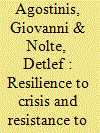

|
|
|
|
|
| Summary/Abstract |
Latin American regionalism displays a long history of crises, which have affected almost all regional organisations (ROs) across different waves of regionalism. The article conducts the first comparative analysis of the outcomes of crises in Latin American ROs across time, tackling the following questions: What have been the outcomes of the crises faced by Latin American ROs? Under what conditions does a crisis result in the survival or breakdown of the affected RO in Latin America? We adopt a multi-method approach that combines QCA with process tracing to identify the causal pathways to the survival or breakdown of ROs across a universe of eight crises. The findings show that Latin American ROs have been resilient to crises, which resulted in RO survival in seven cases out of eight. The QCA reveals how the distributive nature of interstate conflicts and the availability of majority voting are both sufficient conditions for Latin American ROs to survive a crisis. Analysis of the outlier case of UNASUR shows that normative conflicts that take place in the absence of majority voting constitute a ‘perfect storm’ configuration that can lead to RO breakdown. The findings also show that Latin America ROs’ tendency to survive crises is associated with the preservation of the status quo in terms of institutional design, which in some cases is achieved through the temporary flexibilisation of existing rules. Differently from the case of the EU, then, the crises of Latin American ROs have not led to the deepening of regional integration, but rather to institutional inertia.
|
|
|
|
|
|
|
|
|
|
|
|
|
|
|
|
| 13 |
ID:
140732


|
|
|
|
|
| Summary/Abstract |
The field of regionalism has been flourishing for some time. Amitav Acharya has been a persistent and powerful voice in the field, and he has contributed to and actively shaped paradigmatic debates within it. His theoretically sophisticated and contextually grounded approach to Southeast Asia's regional order and beyond has inspired countless scholars and better informed generations of students. A group of scholars, therefore, decided to discuss Acharya's contribution to the field of Asian and comparative regionalism more systematically with a view of the balance between disciplinary and area studies, ideas and institutions and non-Western international relations theorizing.
|
|
|
|
|
|
|
|
|
|
|
|
|
|
|
|
| 14 |
ID:
111540
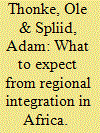

|
|
|
|
|
| Publication |
2012.
|
| Summary/Abstract |
This paper provides a comparative overview of the vast topic of regional integration in Africa. Unlike most literature it includes both security and economic aspects of regional integration. Overall, three mega-trends working in Africa currently will increase the conflict potential in the coming decades unless economic transformation takes off and millions of new jobs are created. Meeting the challenges in the medium term, regional integration is a wise strategy, since it has the potential to deliver conflict mitigation and economic development. The Regional Economic Communities (RECs) in Africa are diverse, dynamic and on different levels of development. Some have progressed tremendously while others have been stalling for decades. As such, they will deliver differently. The vision of a Pan-African Economic Community is not likely to be realised before the deadline of 2028. However, in regions where economic and/or security interests converge and challenges are handled, the RECs may be at similar and in some aspects more advanced levels than the EU of today.
|
|
|
|
|
|
|
|
|
|
|
|
|
|
|
|
|
|
|
|
|